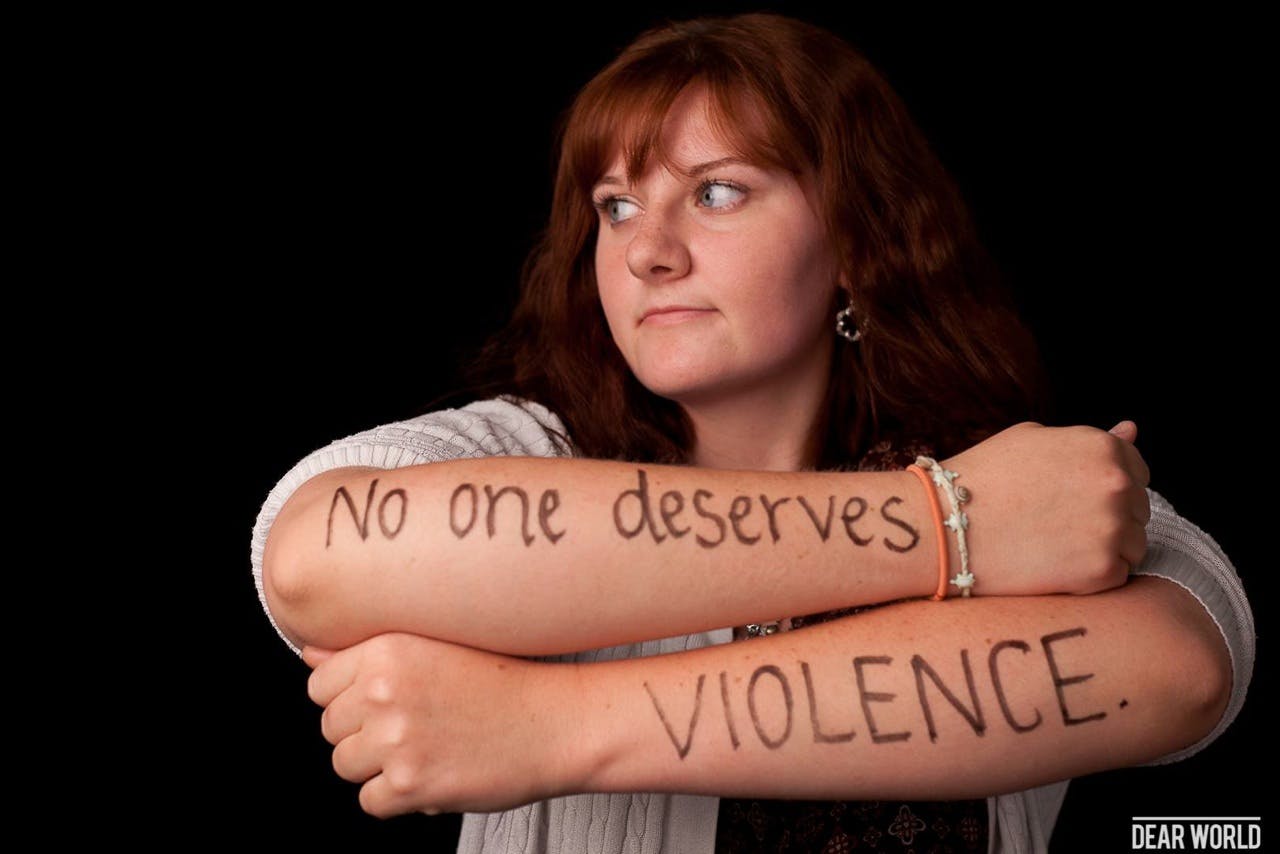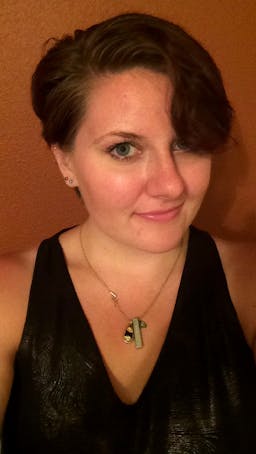Silence Is A Form of Violence
May 28, 2019
Story

Dear World's photo of me with my chosen message: "No one deserves VIOLENCE".
One in three women suffers physical or sexual violence (No Ceilings). One in three women will experience a fragmentation of the self. One in three women will be shamed, denied, and further traumatized when voicing their story. One in three women will suffer physical or sexual violence, but more women will witness violence. I dream of a world in which women are treated as more than a transaction and our definition of violence is not only physical.One in three women as a statistic is a tragedy, but three in three women is an epidemic. This is the reality for many of us and this is my experience with violence.
Violence has been a component throughout various stages of my life. Violence has manifested itself in multiple forms throughout my life. These include physical violence, verbal violence, and sexual violence. Many of my formative years, from birth until age 12, were spent in an abusive family environment. I have memories as early as age 3 of standing in half lit doorways at one in the morning with my sister, watching in confusion as my father thundered verbal abuse upon my half-awake mother. This cloud of anger was a constant storm in our lives and was ready to rain upon us at any moment.
I have distinct memories of belts and hands colliding with skin. I remember consistent threats that my sister and myself would be separated from one another in the case of intervention by Child Protective Services. I remember watching my mother as she fled from yet another shouting match. I remember feeling abandoned by our Catholic private school community and by family members who turned a blind eye. I remember wondering if my mother, my sister, and myself would ever experience freedom. I find myself reflecting on the same to this day. I have transitioned from victim to survivor, but during these reflections I seem to ask myself the same question: how did we survive?
Survival through the power of words has been a main focus of my development. Recently after experiencing an incident of sexual violence I found myself relying on writing to simply get through the day. Physical abuse and sexual violence are mentally and physically taxing. I have experienced entire periods of my life where I felt like little more than a ghost in a matrix of violence. Every catcall, every wandering hand, and every suspicious look become a subtle reminder of the abuse. These subtleties have the ability to feel like daggers. They can dissect you into separate portions of a whole.
I liken the process of becoming a survivor to the cleaning up of a shattered mirror. Reflected in every piece is a portion of the whole self, but some shards are too small to be recovered. These pieces that may have functioned at one time no longer fit into the final result. They must be discarded to form a completely new reflection. Becoming a survivor is a process of holding on and letting go. It is the recognition that the reflection will not always be recognizable, but there is power in the continuous existence of a reflection. We hold onto the reflections of others. We are present, we expand, and we are here. We wake up one day and the mirror is missing pieces, but there is an iridescent quality and our supporters are illuminated by the softness of our reflection.
Survivors are not broken but we are fiercely protective of our vulnerability. Showing vulnerability in the aftermath of abuse is the most empowering way that I have returned to my body and mind. Solutions for ending physical and sexual violence must focus on the importance of establishing supportive spaces for survivors to share our stories. I have seen this in smaller classrooms devoted to feminist philosophy. I have also seen this during survivor support events such as Take Back The Night. I have seen this in student groups such as the Sexual Wellness Advocacy Team (S.W.A.T.) who utilize performance for education and healing. I have seen this during spoken word performances. Spaces where we can be in the midst of our reflections and expand our stories as survivors are the soul of physical and sexual violence prevention. These spaces provide an environment where survivors can share our vulnerability without fear of denial or shame. These are spaces of transformation and not of transaction or exploitation.
Survivors need institutions that treat us as human beings and not as statistics. We have experienced unimaginable trauma, but we are capable of more than existing. Institutions of higher education must be flexible in accommodating the needs of survivors. These needs may include but are not limited to organizing academic exceptions, making therapeutic approaches affordable and confidential for survivors (therapy, meditation, support groups, etc), and presenting safe housing arrangements. We need schools to promote education programs for students on issues of consent, bystander intervention, hegemonic masculinity, and interpersonal partner violence. This education needs to begin before college. Institutions of higher education must stress the sociocultural reasons that survivors may remain with their abuser and they must also stress resources available for refuge and advocacy. We must expand our definitions as a society of what constitutes violence and the different impacts that violence has on the personal. We must also provide more education on the intersectionality of physical and sexual violence. This includes discussing how rates of violence vary by race, age, class level, sexual orientation, gender, level of ability, etc.
Physical and sexual violence are faced by women, men, and LGBTQ individuals from every socioeconomic background. My ideal world is one in which no individual experiences physical or sexual violence. I want to see the day where every person has the freedom of living in their body and does not have this freedom threatened by outside forces. I hope I live to see the day that survivors are more than the sum of our traumas. I hope I live to see a world in which survivors are treated as the sum of our triumphs.
I believe that an ideal world free from physical and sexual violence is not unrealistic. By providing spaces for survivors to triumph and for collaborative education on the sociocultural constructs of violence, it is my hope that we will expand definitions of violence. By changing perceptions and stigmas of survivors we will humanize legislation.We will begin to see a world in which every experience is valued and provided space to expand within our conscious minds as a piece of shared humanity. We will break the glass ceiling of gender-based violence and build bridges of understanding from the pieces.
Silence is violence but we have the power to share. Your story is valid.
You are important and we are here. Thank you.




